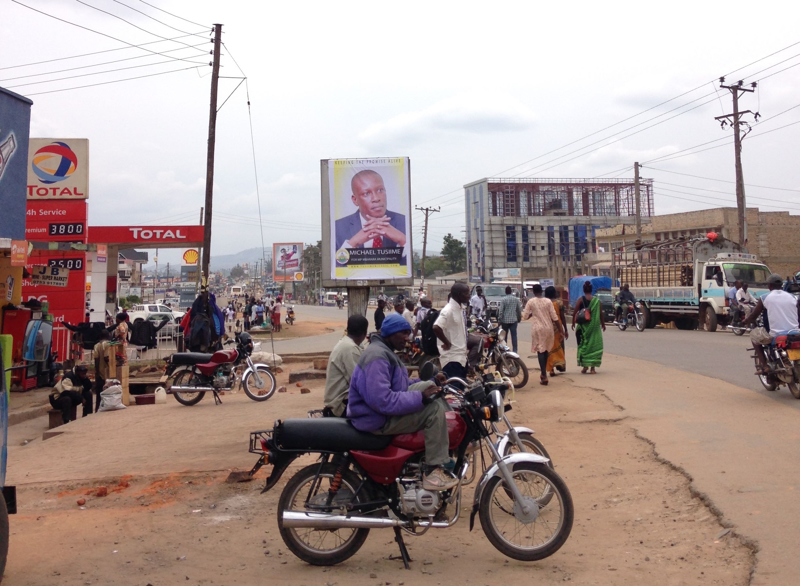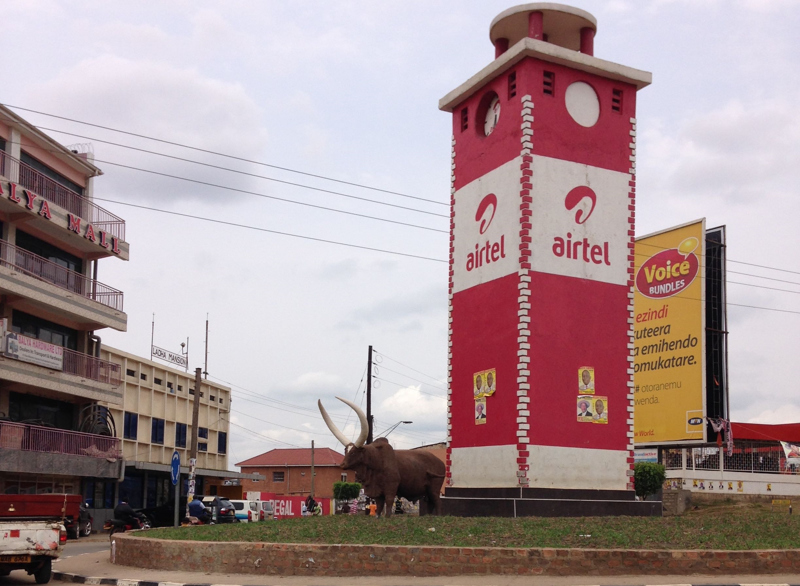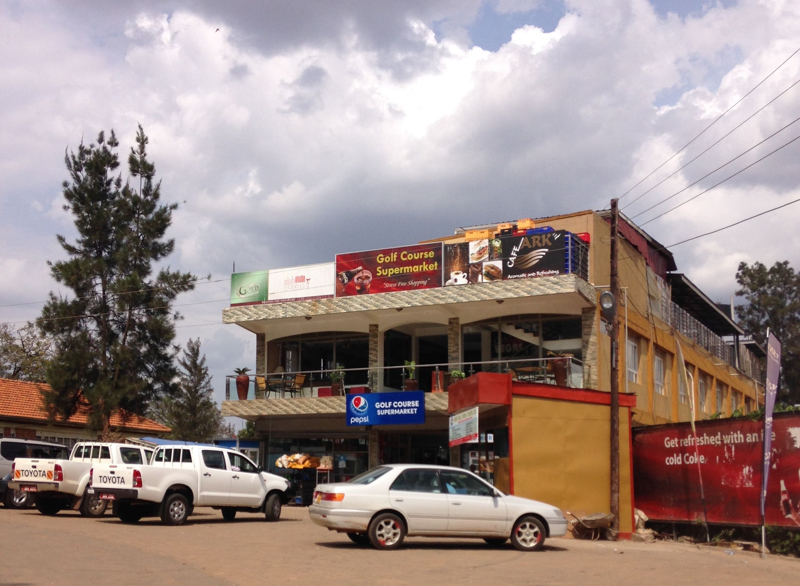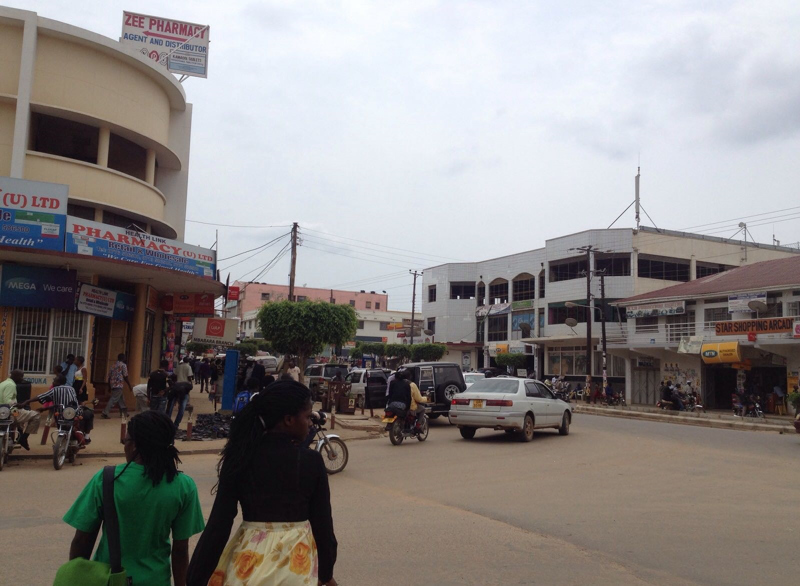Mzungus in Uganda
This is the question that Sacha and I are determined to answer today, and so even though I’m practically dying with post-Leeds Fest flu (thanks for that one Sam, I see our quarantining efforts were not nearly radical enough!) we drag ourselves out of bed for a day of exploring Mbarara.
Unfortunately for us it turns out that Mbarara really is just the road we walked down yesterday, plus the market branching out to the side. Not to worry though, because there has been talk in our travel books of some sort of monument at the entrance to Mbarara that signifies that it is the city of milk… Or something like that. So we take ourselves off down the main street in search of said monument, ignoring all the offerings for the best Bodo Bodo ride ever (it’s like a motorbike taxi), and trying not to fall into any random pot holes in the street (of which there are many). This search continues for a good fifteen minutes or so. Not because we are lost, which even for me is pretty hard to achieve in a one street city, but because we can’t believe what we’re seeing could actually be the monument. It is hilarious. Basically the only thing to see in Mbarara is a life-sized plastic cow, which is overshadowed by the massive phone advertisement behind it. No wonder we didn’t notice it as we arrived! Also, you can’t even get close to it because it’s in the centre of a very busy roundabout, so all photo evidence has been taken at a distance (apologies all short-sighted folk).
After some time giggling and taking pictures, we decide to explore the smaller streets either side of the ‘city centre’. Normally I would have been cautious doing this in a rural African city, however the locals seem totally unbothered by us. If they do talk to us it’s because they’re intrigued by us, rather than they want anything from us. The only other ‘Mzungu’ that we know here are NGO workers and doctors and are therefore, like us, staying for at least a few months. This friendly attitude towards us has definitely helped us feel more comfortable in our new, rarely comfortable environment. Whilst Mbarara’s back streets aren’t much to write home about in terms of aesthetics, we did discover a second market where you can buy all the beautiful colourful fabrics that the locals make clothing out of at super cheap prices. It also has some super jazzy shirts that Dad and Sam can expect as Christmas gifts this year.
So what can you actually do here?
Mbarara, Uganda
This is the question that Sacha and I are determined to answer today, and so even though I’m practically dying with post-Leeds Fest flu (thanks for that one Sam, I see our quarantining efforts were not nearly radical enough!) we drag ourselves out of bed for a day of exploring Mbarara.
Unfortunately for us it turns out that Mbarara really is just the road we walked down yesterday, plus the market branching out to the side. Not to worry though, because there has been talk in our travel books of some sort of monument at the entrance to Mbarara that signifies that it is the city of milk… Or something like that. So we take ourselves off down the main street in search of said monument, ignoring all the offerings for the best Bodo Bodo ride ever (it’s like a motorbike taxi), and trying not to fall into any random pot holes in the street (of which there are many). This search continues for a good fifteen minutes or so. Not because we are lost, which even for me is pretty hard to achieve in a one street city, but because we can’t believe what we’re seeing could actually be the monument. It is hilarious. Basically the only thing to see in Mbarara is a life-sized plastic cow, which is overshadowed by the massive phone advertisement behind it. No wonder we didn’t notice it as we arrived! Also, you can’t even get close to it because it’s in the centre of a very busy roundabout, so all photo evidence has been taken at a distance (apologies all short-sighted folk).
After some time giggling and taking pictures, we decide to explore the smaller streets either side of the ‘city centre’. Normally I would have been cautious doing this in a rural African city, however the locals seem totally unbothered by us. If they do talk to us it’s because they’re intrigued by us, rather than they want anything from us. The only other ‘Mzungu’ that we know here are NGO workers and doctors and are therefore, like us, staying for at least a few months. This friendly attitude towards us has definitely helped us feel more comfortable in our new, rarely comfortable environment. Whilst Mbarara’s back streets aren’t much to write home about in terms of aesthetics, we did discover a second market where you can buy all the beautiful colourful fabrics that the locals make clothing out of at super cheap prices. It also has some super jazzy shirts that Dad and Sam can expect as Christmas gifts this year.




1.
The Journey to Africa
2.
The Long Road to Mbarara
3.
First Impressions of Mbarara
4.
Our first full day as African Residents
5.
So what can you actually do here?
6.
Our first day on the job - or not!
7.
Culture Shocks
8.
Sometimes the best-laid plans go astray…
9.
15 Minutes of Work and a Lifetime of Fame.
10.
Exploring Mbarara so you don’t have to
11.
Uganda’s very own Megabus
12.
We’ll be back Mbarara, all is forgiven!
13.
Lawyer for a day
14.
Entebbe here we come!
15.
“How DARE they call this a botanical garden”
16.
On the road again
17.
Do we get on? We're practically married!
18.
We will work this week!
19.
"You dance well for a white girl"
20.
We have moved!